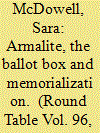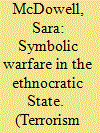| Srl | Item |
| 1 |
ID:
080578


|
|
|
|
|
| Publication |
2007.
|
| Summary/Abstract |
Commemoration of the Northern Ireland Troubles has gained increasing currency since the inception of the first paramilitary ceasefires in 1994. Imagined initially as a mechanism through which to express grief and acknowledge loss, remembering the past has an increasingly social and political value. Inscribing narratives of the past into the streetscape is inexorably linked to the present as some of the main actors of the conflict vie for power and territory. A political resource, memorializtion has been employed as a tool to alter the parameters of the Troubles. This paper focuses on the changing fortunes of Sinn Féin (the political wing of the paramilitary organiztion the Irish Republican Army), and the British government in peacetime Northern Ireland, through an examination of the commemoration of their respective dead
|
|
|
|
|
|
|
|
|
|
|
|
|
|
|
|
| 2 |
ID:
184328


|
|
|
|
|
| Summary/Abstract |
Each year thousands of people seeking better lives in Europe make the treacherous journey across the Mediterranean. Many of those struggling or stranded at sea are rescued by ‘boat people’ comprising NGOs, humanitarian organizations, coast guards and merchant vessels. Under maritime law there is a duty of care towards anyone that experiences difficulty at sea. There is, too, a duty of care by States who under the same law are required to assist ships and allow the disembarkation of those in danger. Yet this practice has important legal, ethical and practical implications and has been challenged by right-leaning political regimes who, making good on election promises to ease immigration, have prohibited such vessels to dock at their ports. This paper, using a case study approach of the humanitarian vessel the Aquarius, considers the ways in which the geographies of care intersect and collide with the geopolitical framing of migrants and refugees. In doing so the paper makes two important contributions. First, it extends conceptualizations of care geographies which are more typically applied to the spatial outworking of health and wellbeing to European migration. It thinks about how care is administered, contested and politicized. The complex concept of care offers a rich lens through which to critique the framing of seaborne migrants and refugees in Europe. Through giving or circumventing legal responsibilities to provide care, seaborne migrants are either humanized or dehumanized. Second, through unpacking the legislative and ethical frameworks shaping search and rescue (SAR) activities in the Mediterranean, we can observe a distinct ‘geopoliticizing of care and responsibility’ whereby these individuals become pawns in wider power dynamics within the European Union.
|
|
|
|
|
|
|
|
|
|
|
|
|
|
|
|
| 3 |
ID:
110760


|
|
|
|
|
| Publication |
2012.
|
| Summary/Abstract |
Ethnocracies defend and protect the hegemony and territory of a dominant ethnic-nation. This article considers how paramilitary or guerrilla organisations professing to act on behalf of minority groups have used non-violent spatial practices such as memorialisation to contest the authority of the ethnocratic state and reassert their own (with varying success). Within ethnocracies where territory is fiercely contested memorialisation has the specific capacity to extend the parameters of conflict constituting a form of symbolic warfare. In exploring the nexus between memorialisation and territoriality this article reflects on the symbolic conflict between the LTTE and the Government of Sri Lanka before the former's obliteration in May 2009.
|
|
|
|
|
|
|
|
|
|
|
|
|
|
|
|